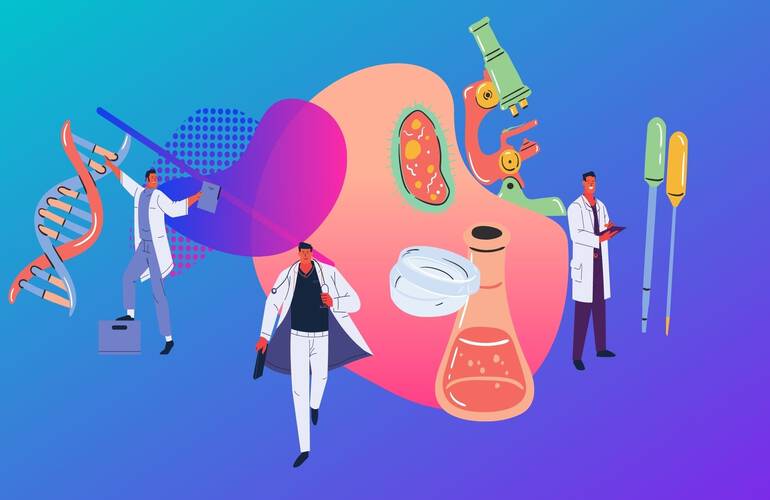What is Microbiology | Who’re Microbiologists? | What does a Microbiologist do?
The present pandemic brought on by the coronavirus has revealed the lethal roles microorganisms perform. However, these unseen organisms could be tamed solely with the input of a microbiology scholar. Besides inflicting illnesses, microbes have essential roles in manufacturing meals, environmental science, medication, and fundamental analysis. Lately, the microbiology course has attained an immense reputation because of a rise in the number of college students who are coming ahead to pursue microbiology as a profession.
What is Microbiology
Microbiology is the research of minute single-celled organisms, most of which are sadly harmful and capable of inflicting communicable ailments. This science department offers an elemental understanding of how a single cell works, detailing the operation and construction of each subcellular part.
While most microbes cause ailments in people, crops, and animals, a variety of microorganisms are utilized in several sectors owing to their helpful properties. For instance, they’re used to prepare meals, merchandise, drinks, and antibiotics. Completely different classes of microbes have been used for the preparation of bread and alcohol for several centuries now. Nevertheless, the largest utility of microbes is within the well-being and medical sector.
Who are Microbiologists?
Microbiology was born within the 12 months of 1674 when Antonie van Leeuwenhoek grew to become the primary microbiologist to watch microbes in a drop of water through a glass lens. Since then, this science of discovering the invisible life has grown boundless. An individual who specializes in the subject of microbiology is named a microbiologist. Microbiologists are considered scientists or researchers who play a pivotal function in discovering numerous microorganisms and infectious brokers that can not be seen with the bare eye.
In addition, they research the interactions of microorganisms with people and different animals that affect our lives.
What does a Microbiologist do?
Microbiologists play an essential function within the meals business as they verify the meals’ security, develop inexperienced applied sciences, and observe the function of microbes in local weather changes. They have in-depth data on microorganisms equivalent to microorganisms, viruses, algae, fungi, and parasites.
Different Types of Microbiologists
Bacteriologists:
They research the sample of development, growth, and different traits of microorganisms, together with the optimistic and unfavourable results that may be led to by microorganisms on crops, animals, and people.
Clinical microbiologists: They execute an unlimited variety of medical laboratory checks on collected specimens from crops, animals, and people to assist in detecting illness. These microbiologists (medical and medical) whose work involves immediately researching human well-being could also be categorized as medical scientists.
Environmental microbiologists research the interplay of microorganisms with the atmosphere and one another. They also research the use of microbes to clean up sites contaminated by heavy metals and examine rising crop development with assistance from microbes.
Industrial microbiologists:
They study industrial manufacturing processes and solve issues associated with those processes. They could also examine microbial development within the pipes of a chemical manufacturing unit. They’ll also control the influence of economic waste on the native ecosystem and even supervise the microbial actions concerned in cheese manufacturing to ensure the standard.
Mycologists:
They research the traits of fungi reminiscent of mould and yeast. Research is made to seek out methods of how fungi may be helpful to society (as an illustration, within the atmosphere or meals) and, likewise, the dangers that fungi could pose.
Parasitologists:
Parasites’ life cycles, host-parasite relationships, and adaptation to different environments are studied. The outburst and management of parasitic ailments reminiscent of malaria might also be investigated.
Public Well-being Microbiologists:
The examination of specimens is completed to pursue, regulate, and avert transmittable ailments and other health hazards. They offer laboratory services for native health products and neighbourhood health packages.
Virologists:
The construction, growth, and additional properties of viruses are studied. The effects that viruses have on contaminated organisms can be researched.
Application of Microbiology
Louis Pasteur and Robert Koch, two of the most notable scientists of the nineteenth century, studied the function of microbes and thereby contributed mainly to medical microbiology. Robert Koch carried out several experiments that have made analyzing illness development simpler today. Pasteur developed several strategies for meal preservation, including pasteurization.
The well-being sector is nearly entirely dependent on microorganisms to analyze and create newer drug varieties and antibiotics. Microbes’ most significant drawback is that they develop resistance quickly. This, in turn, highlights how necessary it is to pursue microbiology as we are but to know a lot more about these good little life kinds.
Microbiology is necessary for superior diagnostic instruments, medical gadgets, and other instruments associated with advanced organic techniques. The topic is equally essential for creating pharmacological merchandise. Microbes are used as model organisms in an analysis program devoted to discovering a treatment for an illness or understanding pathogenesis routes.
Salary of a Microbiologist
In case you are in search of a job as a Microbiologist in India, your standard beginning wage as a brisker shall be around Rs 3 Lakh p.a. With Expertise and ample abilities acquired; you can climb up the profession ladder and seize a pay package deal of as much as Rs 10 lakh p.a. Ifare trying to a to advancee and long run prlong-run within microbiology, a PhD diploma in Microbiologmicrobiologyted topics will do the magic for you.
Location-smart Bangalore tops the list, with various firms and institutes hiring microbiologists. Pune, Hyderabad, Mumbai, and Chennai follow.
Microbiologists usually perform experiments and analyze the outcomes in laboratories, workplaces, and industrial settings. To prevent contamination, they should adopt strict security procedures when working with hazardous organisms.

















